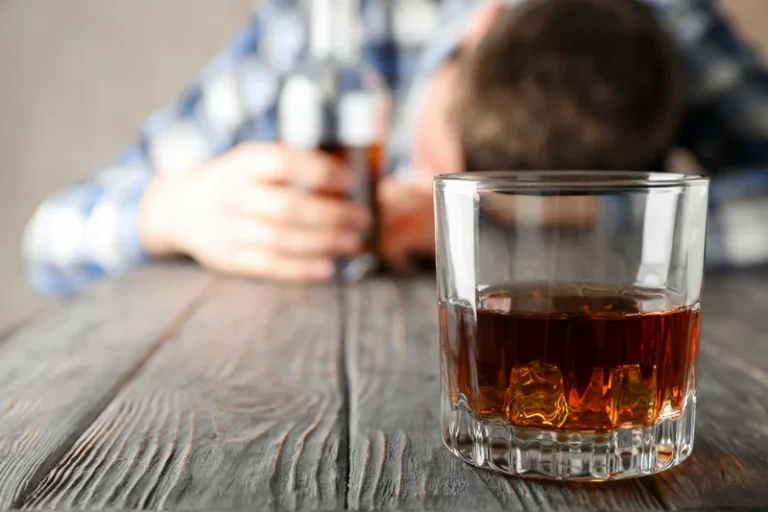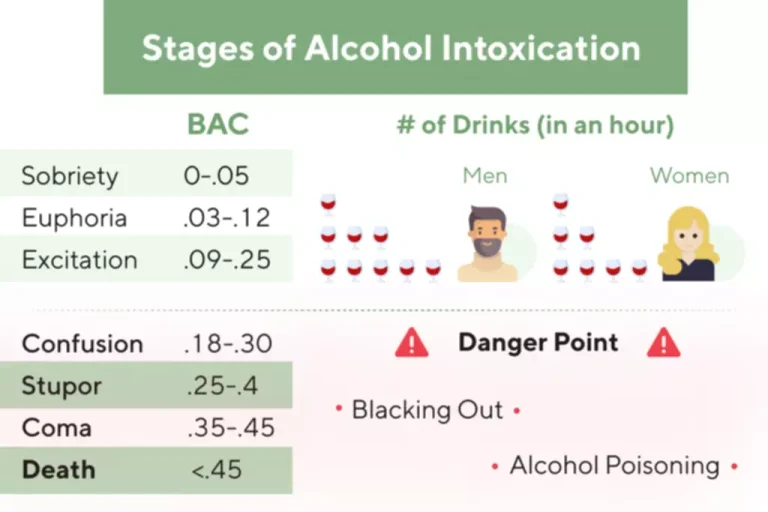Stages of Alcohol Intoxication

Ethyl alcohol, which is contained in all alcoholic drinks, is poisonous to humans. The body has ways to process alcohol. The liver secretes an enzyme called alcohol dehydrogenase, which helps to process ethanol and remove it from the body. However, the liver’s capabilities have their limits. So, if alcohol continues to enter the body, then it does not have time to be processed, and alcohol poisoning or alcohol intoxication is inevitable.

4 Stages of alcohol intoxication
It is customary to divide alcohol intoxication into four stages of intoxication, which differ based on the person’s condition, perception of reality, and the possibilities of treating such conditions.
- First stage – Slight intoxication
It is characterized by a feeling of warmth, a comfortable state, accompanied by muscle relaxation. The mood is enlightened and the person sees the world through rose-colored glasses and thinks that everything is wonderful. Unpleasant events and memories fade into the background. Emotional effects intensify: everyone seems to be close friends with whom you want to share your innermost secrets. As alcohol levels in the blood increase, the person becomes arrogant, while perceiving oneself as very witty and polite. The perception of time and space is impaired, therefore alcoholic intoxication is especially dangerous when driving and operating machinery. After alcohol is eliminated from the body, a person remembers all the events.
- Second stage – Moderate intoxication
The mood becomes unstable, which is characterized by mood swings. From hugs, kisses, and confessions of love and respect, one can go to rudeness absolutely without reason. The actions of a drunk individual are difficult to predict. At this stage, attacks of aggression are possible, one can be dangerous for oneself, as they lose a sense of danger. Uncoordinated walking and movements, slurred speech, and feeling of tiredness are other signs of moderate intoxication. The intoxication of moderate severity usually gives way to deep sleep. In the morning, signs of alcohol intoxication are observed: weakness, exhaustion, depressed mood, thirst, decreased or lack of appetite, discomfort in the heart area. Some events that took place during the period of intoxication may not be clearly remembered.
- Third stage – Severe intoxication
The person has practically no control over their movements, it is difficult to pronounce words. The meaning of the phrases is lost, a person finds it difficult to find the right words, sometimes they use words and phrases that are devoid of any meaning. Dizziness, walking in an abnormal, uncoordinated, or unsteady manner are observed. Falls are possible. A period of arousal is usually followed by drowsiness. A person can fall asleep anywhere without responding to the temperature of the external environment. This is the stage of intoxication that requires help before it is too late.

- Fourth stage – Extreme intoxication
This stage is characterized by severe neurological disorders, possibly affecting the deep parts of the central nervous system. This is fraught with serious complications, up to lethal. With the progression of intoxication, consciousness impairment intensifies, up to the development of a coma, breathing slows down, the cardiovascular system dysfunction worsens. In this case, uneven heart rate and breathing, convulsive (like epileptic) seizures, and spontaneous urination and bowel movements are possible. One is likely to develop complete amnesia. With the development of an alcoholic coma, getting sober at home can lead to the most terrible consequences. As a result of the paralysis of the respiratory or vasomotor center, death can occur. This stage of intoxication requires the help of an emergency team.

Take back control of your life and start on the road to recovery now.
BAC Levels
Now that we have reviewed the stages of alcohol intoxication, let’s see how they correlate with BAC levels. For an easier understanding of this relationship, we will refer to a visual representation of these stages of intoxication along with a number of drinks and BAC levels.
As you can see, if the person drinks in moderation, the intoxication level is not dangerous and the person is not even likely to feel and look intoxicated, although reaction time and judgment can be somewhat impaired. As the number of drinks increases, so does the danger of alcohol poisoning and even death.

An important point to remember when looking at the BAC levels and stages of alcohol intoxication is that the signs and symptoms associated with each state do not appear right away because the body needs some time to process this alcohol. The time it takes for the alcohol to get into one’s blood depends on many factors, such as whether a person ate before or during drinking, body weight and BMI, health, drink strength, etc.
What does this mean? At the time a person drinks, all the symptoms and signs of a more severe stage of intoxication might not yet appear. Thus, it is important to know how many drinks will bring you to a certain state of intoxication and limit yourself to only that particular amount of alcohol, keeping in mind all the factors that might influence the BAC levels. There are numerous alcohol trackers and drink-counting apps available for downloading, which can be helpful in ensuring that you do not drink more than recommended and/or planned.
It is not necessary to have all of the above signs or symptoms before seeing a doctor. If you suspect that you or someone else has been poisoned by alcohol, seek emergency medical attention immediately. In addition to checking for visible signs and symptoms of alcohol poisoning, the doctor will likely order blood and urine tests to check blood alcohol levels and look for other signs of alcohol intoxication, such as low blood sugar. If you or someone you know has a hard time controlling alcohol intake, seek professional help for alcohol dependence or alcoholism.




